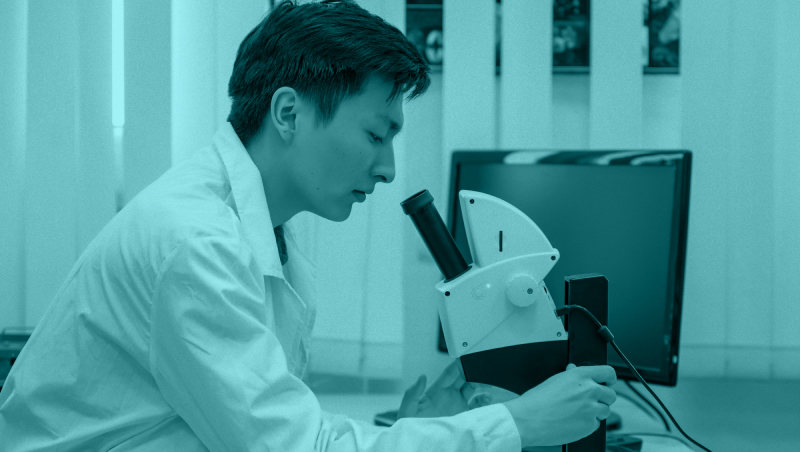05.04.01 Geology
A master's program in geotechnical monitoring with a focus on oil and gas facilities designed for graduates of undergraduate engineering programs.
Geotechnical monitoring is required in the design, construction and operation of complex facilities, works in permafrost zones, unstable or swampy soils, seismic zones and other particularly difficult natural conditions. It allows monitoring of deformation processes and prevention of accidents and other hazards, including environmental ones.
The Program graduates will be able to offer optimal solutions to eliminate deformations of structures. To do this, they use deformation monitoring tools and techniques for predicting the behavior of soils in interaction with an engineering object.
The program features a combination of fundamental and practical training, interdisciplinarity, flexibility, use of electronic resources and project-based approach.
Specialized laboratories and equipment are available for training, and close links with industry organizations are established. The teaching staff includes professors with highest academic credentials and practitioners who have experience in solving industrial problems.
Tomsk Polytechnic University has been training specialists in geotechnical monitoring for 93 years, with the total number of trained professionals reaching more than 3,000.
Read more about the program here.
What you will learn
- perform geotechnical monitoring (GTM) of field construction facilities: analyze and process data from GTM results
- perform calculations of stress-strain state of buildings and facilities structures, predictive simulation modeling of ground conditions, and thermal engineering calculations
- prepare reporting documentation on geological and engineering operations in accordance with standards and technical documentation (protocols, analytical notes, technical opinions with conclusions and recommendations, etc)
Program description
The program starts with disciplines that systematize the knowledge of geology, hydrogeology, geocryology, familiarize with the regulatory and legal bases for the organization of geotechnical monitoring, provide knowledge of the geotechnical monitoring methods, and the basics of scientific research.
Then students study the equipment and design of geotechnical monitoring networks, peculiarities of engineering structures, soil mechanics, bases and foundations. The educational process includes course design projects and summer internships.
At the next stage students process geotechnical monitoring data using general-purpose and specialized software, model the stress-strain state of the geotechnical system, changes in temperature and water regime of the soil mass in interaction with an engineering structure and make a forecast.
The program is especially focused on geotechnical monitoring under special conditions. These include construction of unique buildings and facilities, construction of objects in dense urban areas, spread of organomineral and organic, bulk, subsidence, perennially frozen soils, construction in earthquake-prone zones, in areas with landslide processes, karst, waterlogged, and undermined areas. Students learn to develop recommendations for engineering soil stabilization, and they are engaged in research activities.
The competencies of future graduates are expanded due to the study of numerical modeling in soil mechanics, innovative construction technologies, damage control activities, engineering survey methods and tools.
Graduation Thesis
The purpose of the final qualification work is to present competence in determining dangerous deformations of structures, the causes of their occurrence and actions to eliminate them with the help of the best methods for obtaining and processing information about the geotechnical condition of objects and software for processing and presentation of research results.
Laboratories and equipment
-
Educational-research laboratory "Soil Science and Soil Mechanics" (UNIL GIMG) studying the composition and physical and mechanical properties of soils.
-
Problem research laboratory of hydrogeochemistry studying chemical, gas, and microbiological composition of water in different natural conditions.
-
Computer classrooms for practical work with specialized software for solving mapping problems and using geographic information systems (GIS), hydrogeological modeling, three-dimensional modeling of changes in the Earth's temperature field.
Internship and employment
During the program, students have practical training in leading Russian design and mining organizations.
The educational program includes:
-
introductory internship;
-
training practice on obtaining professional skills and experience;
-
research work;
-
industrial pre-graduation internship.
During internship, students acquire professional skills and experience:
-
performing field geotemperature, hydrological, snow observations and measurements;
-
real time control of foundations of operated buildings and objects under construction;
-
preparation of analytical reports and conclusions on the issues of geotechnical monitoring;
-
performing special calculations and constructions based on the results of field works on the equipment and repair of the geotechnical monitoring network;
-
preparation of information reports on the results of field works;
-
recovery of damaged elements of the monitoring network;
-
registration, systematization and preservation of field monitoring information;
-
keeping records of engineering, geological, thermometric and hydrogeological wells and preparing defect lists.
Career Opportunities
Our graduates are sought-after in companies that operate engineering structures, in construction and design organizations related to engineering and geological surveys.
Graduates of Geotechnical Monitoring program will find jobs in research institutes, large construction companies, state corporations, regional and municipal authorities in their respective specialization area.
Graduates
- Valery Nikolayevich Sakharov - General Director of Geotechnika LLC (Kemerovo), class of 1985;
- Vasily Aleksandrovich Uvarov - Head of the Department of Engineering Survey Expertise of OAO TomskNIPIneft, class of 2005;
- Nailia Adhamovna Zaripova, Director of LLC Sibautsorsproekt (Novosibirsk), class of 2013;
- Aliya Albertovna Mukhamedyanova, Head of Soil Laboratory, LLC NTI (St. Petersburg), class of 2019.
